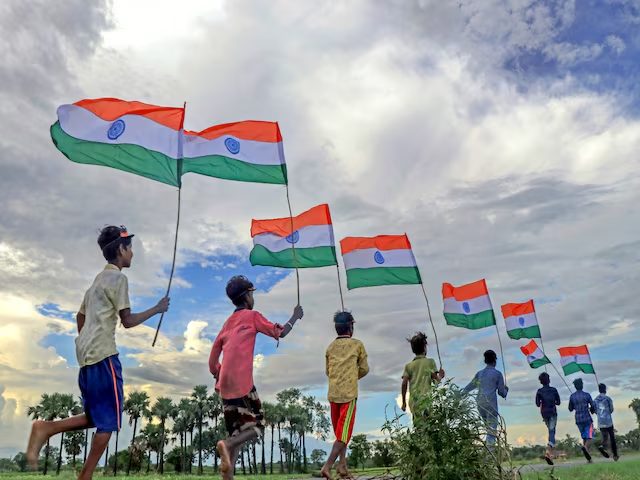Opinion | Remembering Partition Horrors, Commemorating the Tricolour: PM Modi’s Twin Calls
- By : Anirban Ganguly
- Category : Articles
- Tags: Har Ghar Tiranga, Indian tricolour, Partition of India

In 2022, when Prime Minister Narendra Modi proposed declaring August 14 as a day of remembrance for those who suffered the torments of partition and also perished in it, a section of the gatekeepers of history writing and dissemination opposed him. They opposed his naming the remembrance as ‘Partition Horrors Remembrance Day.’ Some argued: Why should the tragedy of partition be recalled and remembered? Those who argued in this manner belonged to a political ideology and lineage that has always attempted to suppress or obfuscate the history and story of partition. They were akin to those in the West who worked overtime to dilute the memory of the Holocaust. These gatekeepers and controllers of narrative exerted themselves to ensure that the Holocaust was never discussed or would eventually be forgotten, subsumed by monotony, routine, and fatigue.
In a reissue of Primo Levi’s classic If This Is a Man/The Truce – Survival in Auschwitz, British novelist and journalist Howard Jacobson poignantly observes, “The danger, as time goes by, is that we will tire of hearing about the Holocaust, grow not only weary but disbelieving, and that out of fatigue and ignorance more than cynicism, we will belittle and, by stages, finally deny—actively or by default—the horror of the extermination camps and the witness, by then so many fading memories, of those who experienced them. The obligation to remember is inscribed on every Holocaust memorial, but even the words ‘Never Forget’ become irksome eventually. We don’t like being reminded of our obligations; we don’t want to go on taking the medicine, especially when we don’t accept that we are sick.”
The call for observing ‘Partition Horrors Remembrance Day’ in the Indian context was to ensure that fatigue, disbelief, and a propensity to ignore or belittle never set in when discussing freedom and partition. For years after the war, until the mid-1960s, the Western intelligentsia and narrative builders among them did not think it necessary to allow or encourage discussion on the Holocaust. It was the ‘mute decade’ when the world did not want to discuss or talk about this dark episode in global history. Similar attempts were made in the case of India’s partition. While literature, both fiction and non-fiction was eventually produced, a vocal and influential section always sought to whitewash the harsh reality, the effects of partition, and the accompanying trauma that scarred entire generations. The impact of partition on the eastern front, in particular, received such treatment.
Screenwriter and author David Baddiel succinctly captures this when he writes, “Immediately after the war…there was a mute decade, something akin to collective post-traumatic shock, when the world just didn’t want to think or talk about the Holocaust and its extermination camps.”
H.V. Seshadri, in his widely read The Tragic Story of Partition, speaks of a linear and tailored version of history designed to suit a particular section. “Certain interpretations of historical events,” writes Seshadri, “are often taken as gospel truths. History thus becomes tailored to suit that interpretation, which in turn becomes an authentic chronicle of historical developments for future generations. Especially when the events are of the recent past and leading political figures have taken part in them, this tendency is sure to be all the more pronounced. Naturally, in the process, history gets distorted. A distorted and garbled version of history can serve neither as a point of inspiration nor as a warning to the nation in its future march.” In the case of the history of the partition of our country, Seshadri argues, “something like this appears to have happened.”
Between erasure and selective remembrance, and between distortion and suppression, the memory of the horrors of partition has started to be diluted and watered down over the decades.
Modi’s call for remembering the horrors of partition was not a partisan one. He spoke of the need for a free nation to remember those who suffered the effects of partition, who could not live in a free India, and who faced displacement and decimation with their dignity and future snatched away. Some found fault even with that call and displayed a mindset that seemed deeply uncomfortable with the bitter truths of history. Yet people responded, and scholars responded to Modi’s call for observing ‘Partition Horrors Remembrance Day’, with descendants of those affected by partition finding in his call for remembrance a certain quiet fulfilment.
Every year since then, across India—from the hills of the northeast to the deserts of Rajasthan, to states and regions that did not suffer the trauma of partition—‘Partition Horrors Remembrance Day’ has been observed. The memory of the horrors of one of the most excruciating phases in our history is being passed on. It has also started liberating the narrative of interpreting and articulating the partition story and history.
Similarly, the call of ‘Har Ghar Tiranga’ given by Prime Minister Modi moved the masses. Never before had such a call been given, nor had the ‘tricolour’ been collectively honoured in this manner. This too faced opposition from political and intellectual quarters. But, as with many other special movements Modi initiated during his two decades in elected public office, the ‘Har Ghar Tiranga’ campaign elicited a massive response. Across age groups and professions, and across the length and breadth of the country, the response was energetic and genuine. Indians across the globe also poured their hearts and emotions into his call.
The call for remembrance and commemoration was not isolated or disjointed. One was for remembering the horrors and trauma of division, of being abruptly uprooted, of being denied the sensation of freedom—memories that need to be passed on across generations to ensure they are neither forgotten nor allowed to be repeated. The other was for commemorating the hard-earned struggle for freedom, celebrating its highest symbol—the national flag—as its anchor and upholding pillar, never to be bartered away, forsaken, or marginalised. Both the remembrance and commemoration aim to enlarge, widen, and deepen the individual self into a wider and larger collective self, national and civilisational.














